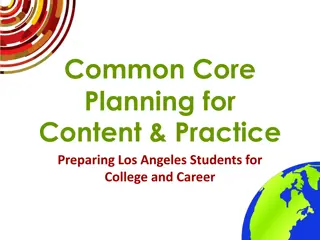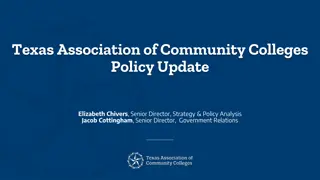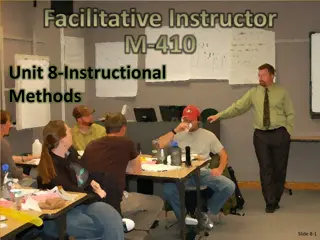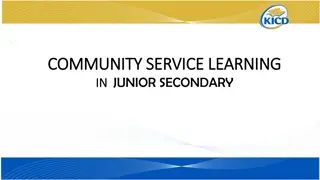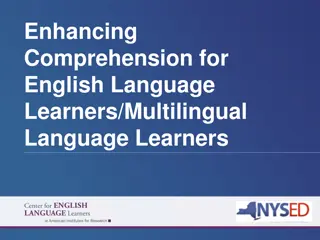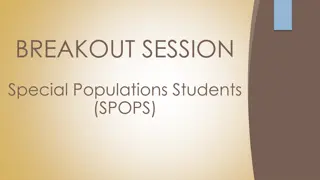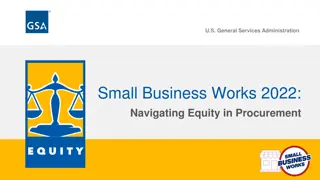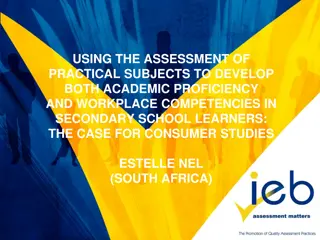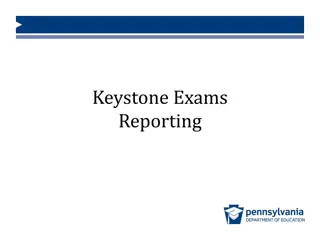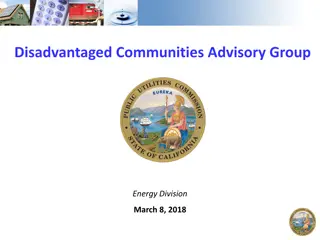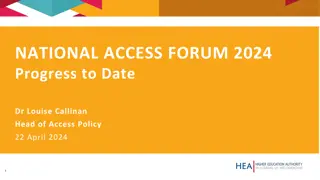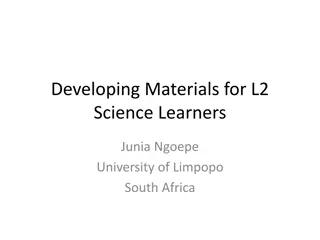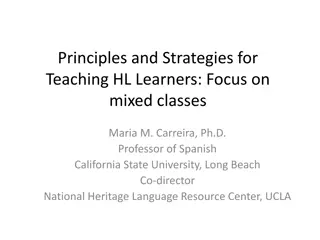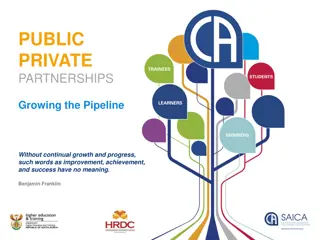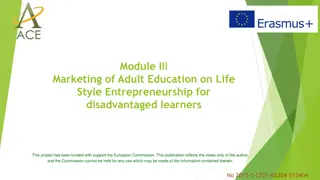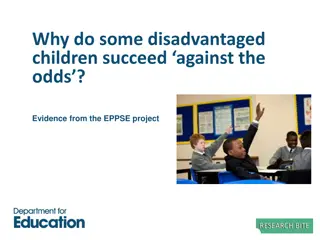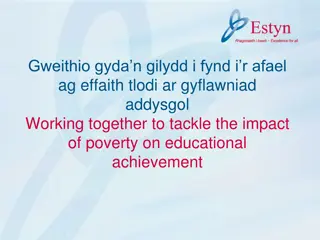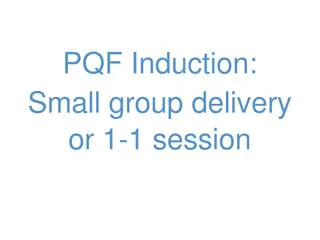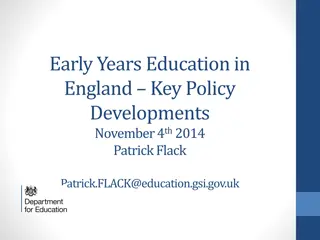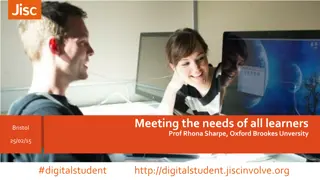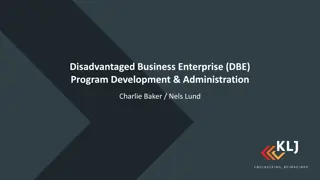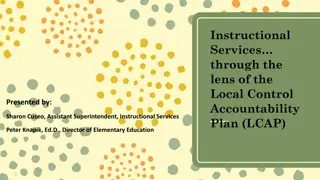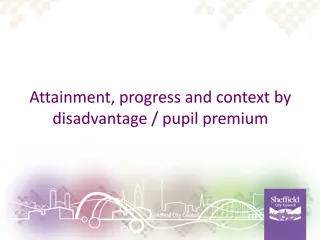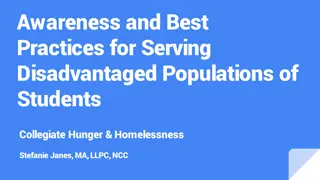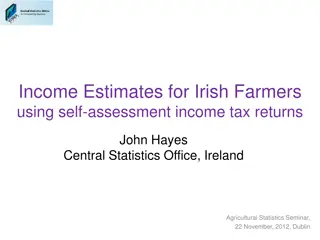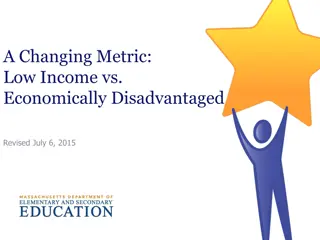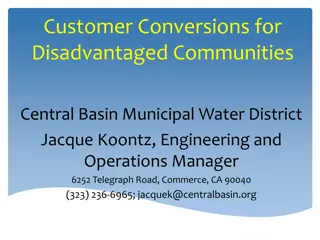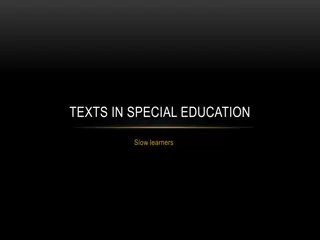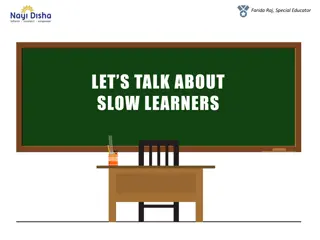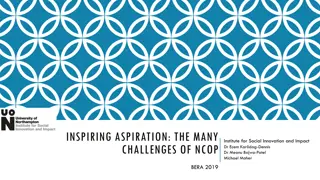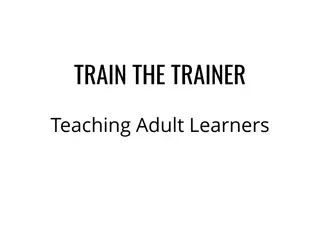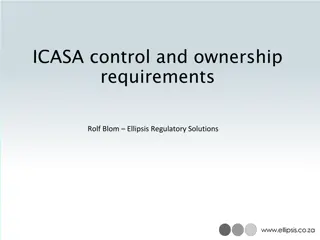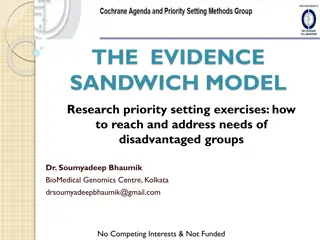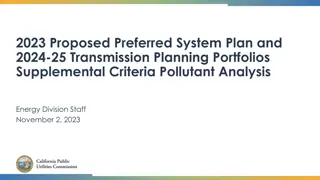Supporting Transitions for Autistic Learners in Scottish Education
This professional learning module focuses on supporting autistic learners in Scotland through effective transitions. Topics covered include terminology, the Scottish context for autism and inclusion, understanding autism, assessment and monitoring, supporting learners and families, social and emotio
0 views • 21 slides
Overview of U.S. General Services Administration's Office of Small and Disadvantaged Business Utilization (OSDBU)
This overview discusses the role of the Office of Small and Disadvantaged Business Utilization (OSDBU) within the U.S. General Services Administration (GSA). It highlights the advocacy for small businesses in federal acquisitions, inclusion of small businesses as contractors, and management of small
3 views • 51 slides
Climate Justice & Disadvantaged Communities: Environmental Issues in US EPA Region 2
Climate justice and the impact on disadvantaged communities are key environmental issues addressed by Adriana Espinoza, Deputy Commissioner for Equity & Justice in US EPA Region 2. The initiative identifies and prioritizes disadvantaged communities based on multiple criteria, including environmental
5 views • 18 slides
Enhancing Common Core Aligned Math Lessons for Los Angeles Students
Plan and implement Common Core aligned problem-based math lessons using John Van de Walle's Three-Phase Structure to prepare Los Angeles students for college and career success. Explore strategies to cater to diverse learners such as English learners, Standard English learners, Students with Disabil
4 views • 23 slides
Texas Association of Community Colleges Policy Update Overview
This update highlights key components of House Bill 8 focusing on financial aid for Swift Transfer, shared services, performance tier, base tier, and the Community College Standing Advisory Committee. It also discusses the state's investment in community colleges, the HB 8 funding model, and the tra
0 views • 18 slides
Effective Instructional Methods for Adult Learners
Explore six effective instructional methods for adult learners, including advantages and limitations of each. Learn how to mitigate behavior problems associated with adult learners. Discover appropriate methods for teaching first aid, FireWise principles, disseminating policy information, and discus
0 views • 13 slides
Enhancing Learning Through Community Service Learning in Kenya
Acknowledging the lasting impact of engaging learners in community service, Kenya is shifting focus towards Community Service Learning (CSL) to foster holistic development and prepare learners for the workforce. Emphasizing experiential learning, CSL integrates classroom education with community ser
0 views • 21 slides
Pedagogical Shift in Physical Science: Constructing Knowledge Through Learner-Centered Experiences
There is a significant pedagogical shift in physical science education from viewing science as a fixed body of knowledge to emphasizing the process of constructing knowledge. Learners are now placed at the center stage, engaging in inquiry-based learning, critical thinking, and collaborative interac
3 views • 21 slides
Enhancing Comprehension for English Language Learners/Multilingual Language Learners
This presentation focuses on scaffolding English language arts instruction to enhance comprehension for English Language Learners (ELLs) and Multilingual Language Learners (MLLs). It covers strategies like close reading, building background knowledge, and vocabulary development. The goal is to suppo
0 views • 73 slides
Understanding Special Populations Students in CTE Programs
Special Populations Students in Career and Technical Education (CTE) programs include individuals with disabilities, economically disadvantaged individuals, single parents, English Language Learners, migrants, homeless individuals, and more. These students may require Individualized Education Progra
0 views • 9 slides
Understanding the 8(a) Business Development Program and Equity in Procurement
The 8(a) Business Development Program, created by the U.S. Small Business Administration, aims to assist socially and economically disadvantaged small businesses in developing and growing. This program provides opportunities for small companies to secure federal contracts and procurement. The progra
2 views • 31 slides
Enhancing Academic Proficiency and Workplace Competencies in Secondary School Learners through Consumer Studies Assessment
In South Africa, the National Senior Certificate (NSC) and the Independent Examinations Board (IEB) play crucial roles in assessing learners' academic proficiency and workplace competencies. Consumer Studies, as an elective subject, is integral in developing responsible consumer behavior and equippi
1 views • 23 slides
Guide to Keystone Exams Reporting Procedures
Keystone Exams Reporting provides detailed instructions on submitting accurate data to the Pennsylvania Information Management System (PIMS) for grades 3-12 students. The process involves updating templates, ensuring data quality, running verification reports, and complying with snapshot deadlines.
0 views • 14 slides
Disadvantaged Communities Advisory Group - SB 350 Related Programs and Appointments
The Disadvantaged Communities Advisory Group focuses on the implementation of SB 350 and related programs to benefit disadvantaged communities. The group prioritizes access to clean energy technologies, affordability of energy services, and maximizing economic and environmental improvements. Appoint
0 views • 11 slides
Progress Update on National Access Forum 2024 Goals
The National Access Forum 2024 has set ambitious goals for higher education in Ireland, aiming for inclusivity, diversity, and equitable opportunities for all students. The focus is on increasing access for underrepresented groups such as those from socio-economically disadvantaged backgrounds, matu
0 views • 14 slides
Supporting English Second Language Science Learners at University of Limpopo
Developing materials for L2 science learners at University of Limpopo to support previously disadvantaged English second language science learners. The program aims to help students succeed in Maths and Sciences, enabling more black students to enter science-based programs. Focus on improving Englis
3 views • 34 slides
Teaching Strategies for Heritage Language Learners in Mixed Classes
Explore essential concepts in teaching heritage language learners in mixed classes, focusing on project-based teaching. Understand the characteristics of native speakers, heritage speakers, and second language learners. Learn about the motivations of heritage language learners and the implications f
1 views • 48 slides
Public-Private Partnerships: Growing the Pipeline for Success
Fostering collaboration between businesses, universities, and government entities to enhance education and skill development for learners at various levels. This initiative aims to cultivate different forms of capital to empower individuals and institutions, particularly historically disadvantaged o
0 views • 7 slides
Marketing Strategies for Adult Education in Entrepreneurship
This project focuses on developing marketing competences for adult educators to engage disadvantaged learners in lifelong learning and entrepreneurship training. The aim is to empower learners through effective marketing strategies and communication channels, highlighting the social and psychologica
0 views • 39 slides
Understanding How Disadvantaged Children Succeed: Insights from the EPPSE Project
Disadvantaged children often face challenges in education, but some manage to succeed against the odds. The Effective Pre-School, Primary, and Secondary Education (EPPSE) Project sheds light on the factors contributing to their success. Parents play a crucial role by actively engaging their children
0 views • 12 slides
Working Together to Tackle Poverty's Impact on Education
This report delves into partnership efforts among schools, local authorities, and various agencies to address the effects of poverty on educational achievement. Highlighting best practices through case studies, the study emphasizes the importance of prioritizing poverty alleviation in educational se
0 views • 22 slides
Understanding the Purpose of Pre-Accredited Education and Quality Frameworks
Explore the purpose of pre-accredited education, which aims to provide pathways for disadvantaged learners. Learn about the Quality Pre-accredited Framework, ensuring high-quality courses are delivered consistently. Delve into different aspects such as course planning, teaching, moderation, and impl
1 views • 22 slides
Key Policy Developments in Early Years Education - England 2014
The early years education landscape in England underwent significant changes in 2014, focusing on providing entitlements for three- and four-year-olds, with recent extensions for two-year-olds. The government aimed to support school readiness and parental labor market access through various interven
0 views • 9 slides
Understanding Special Populations Students in CTE Programs
Students who have special learning needs are considered special populations students in CTE programs. They include individuals with disabilities, economically disadvantaged individuals, single parents, English Language Learners, migrants, homeless individuals, youth in foster care, and youth with pa
0 views • 9 slides
Meeting the Needs of All Learners in the Digital Environment in Further Education
Prof. Rhona Sharpe from Oxford Brookes University discusses how learners experience the digital environment in further education, highlighting the importance of meeting the diverse needs of learners. The content covers various aspects such as vocational backgrounds, prior educational/work experience
0 views • 13 slides
Developing and Administering a DBE Program for Small Businesses
The Disadvantaged Business Enterprise (DBE) Program aims to support small businesses owned by socially and economically disadvantaged individuals. These individuals belong to various groups such as Black Americans, Hispanic Americans, Native Americans, Asian-Pacific Americans, Subcontinent Asian Ame
1 views • 16 slides
Overview of Instructional Services through LCAP
Explore how Instructional Services, including Elementary Education, Special Education, Child Development, Instructional Technology, Arts & Career Technical Education, and Induction programs, are structured and evaluated within the context of the Local Control Accountability Plan (LCAP). The organiza
0 views • 38 slides
Improving Attainment and Progress of Disadvantaged Pupils in Sheffield
Attainment and progress of disadvantaged pupils in Sheffield show an improving trend across key stages, although the gaps between disadvantaged and non-disadvantaged students are not closing fast enough. Data suggests that disadvantaged pupils with low prior attainment are making better progress in
0 views • 29 slides
Understanding Collegiate Hunger and Homelessness Among Disadvantaged Student Populations
This collection of resources sheds light on the challenges faced by disadvantaged students in terms of collegiate hunger and homelessness. It discusses the myth of meritocracy, the importance of self-awareness, and presents insights from the "Hunger on Campus Report," highlighting food security leve
0 views • 16 slides
Analysis of Irish Farmer Incomes Based on Income Tax Returns
This paper presents an analysis of Irish farmer incomes in 2010 using self-assessment income tax returns from the Revenue Commissioners. The study focused on various income sources such as trading income, rental income, employment income, social welfare transfers, and pension income. The dataset com
0 views • 12 slides
A Changing Metric: Low Income vs. Economically Disadvantaged
Historical data on low-income students in Massachusetts, collected for various purposes including school nutrition, federal entitlement allocations, and research projects. The introduction of the Community Eligibility Provision (CEP) program in 2011 aimed to provide free meals to qualifying students
0 views • 14 slides
Enhancing Water Accessibility for Disadvantaged Communities through Recycled Water Conversions
Design and installation of recycled water pipeline laterals, conversion of 9 sites in 6 Disadvantaged Community locations, and expansion of recycled water use to benefit communities. Project includes outreach strategies, funding details, and program preferences aimed at reducing groundwater pumping
0 views • 10 slides
Understanding Slow Learners in Special Education
Slow learners are individuals who take longer to grasp concepts and struggle with traditional academic demands. They are not disabled but may lack interest in conventional educational systems. It is important not to confuse slow learners with students needing special education or those who are non-c
0 views • 4 slides
Understanding Slow Learners: Characteristics, Signs, and Support Strategies
Learn about slow learners through the perspective of Farida Raj, a special educator. Discover the characteristics and signs of slow learners, such as difficulties in grasping abstract concepts, poor self-image, and slow task completion. Find out how to spot the signs and provide necessary support th
0 views • 14 slides
Understanding Learner Styles and Strategies
Learner styles and strategies play a crucial role in education. There are two main types of learners - Analytic Learners who focus on details first, and Holistic Learners who prefer understanding the whole concept. Analytical learners excel at recalling facts, excel in math and science, and are good
0 views • 37 slides
Addressing Challenges of Disadvantaged Students Through NCOP Outreach
This research paper delves into the National Collaborative Outreach Programme (NCOP) and its impact on disengaged and disadvantaged students, focusing on parental engagement and wider social issues. Drawing on Bourdieu's cultural capital concept, the study evaluates the effectiveness of NCOP activit
0 views • 16 slides
Understanding Adult Learners: Key Characteristics and Strategies
Characteristics of adult learners include being goal-oriented, self-directed, valuing past experiences, desiring respect, and having established habits and opinions. Understanding these traits is essential for effective teaching and training. Adult learners seek practical information, immediate feed
0 views • 47 slides
Understanding ICASA Control and Ownership Requirements
In South Africa, the Independent Communications Authority of South Africa (ICASA) regulates the licensing framework for electronic communications services. ICASA's mandate involves establishing licensing frameworks, promoting ownership by historically disadvantaged groups, and supporting black econo
0 views • 14 slides
Evidence Sandwich Model: Addressing Needs of Disadvantaged Groups
In a world of medical advancements, reaching those in resource-poor settings remains a challenge. The Evidence Sandwich Model explores ways to prioritize research, collaborate, and tackle implementation bottlenecks to deliver basic care to disadvantaged populations. Led by Dr. Soumyadeep Bhaumik, th
0 views • 18 slides
Criteria Pollutant Analysis for California's Electric Sector Planning
The analysis focuses on minimizing air pollutants and greenhouse gas emissions, with a priority on disadvantaged communities, as directed by California's Public Utilities Commission. It includes quantifying criteria pollutants within and outside of Disadvantaged Communities (DACs) for the years 2026
0 views • 15 slides



